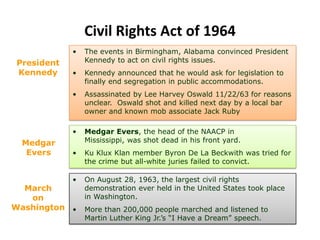
Civil rights legislation
- 1. Civil Rights Act of 1964 • Medgar Evers, the head of the NAACP in Mississippi, was shot dead in his front yard. • Ku Klux Klan member Byron De La Beckwith was tried for the crime but all-white juries failed to convict. President Kennedy • The events in Birmingham, Alabama convinced President Kennedy to act on civil rights issues. • Kennedy announced that he would ask for legislation to finally end segregation in public accommodations. • Assassinated by Lee Harvey Oswald 11/22/63 for reasons unclear. Oswald shot and killed next day by a local bar owner and known mob associate Jack Ruby Medgar Evers • On August 28, 1963, the largest civil rights demonstration ever held in the United States took place in Washington. • More than 200,000 people marched and listened to Martin Luther King Jr.’s “I Have a Dream” speech. March on Washington
- 2. Passing the Civil Rights Act President Johnson supported passage of a strong civil rights bill. Played sympathy card Used Kennedy’s death to gain support Some southerners in Congress fought hard to kill his bill. Johnson signed the Civil Rights Act of 1964 into law on July 2, 1964. The law banned discrimination in employment and in public accommodations.
- 3. Gaining Voting Rights for African Americans in the South President Kennedy was worried about the violent reactions to the nonviolent methods of the civil rights movement. Attorney General Robert Kennedy urged SNCC leaders to focus on voter registration rather than on protests. He promised that the federal government would protect civil rights workers if they focused on voter registration. Hundreds of people volunteered to spend their summers registering African Americans to vote.
- 4. Freedom Summer (1964) – Less than 7% registered prior • Lowest in country • Campaign to register Blacks in Mississippi to vote known as Freedom Summer – Opened Freedom Schools and Community Centers – Taught core reading and math classes along with civics – Provided free medical and legal assistance • Arrival of hundreds of volunteers was met with massive violence. – CORE, NAACP, and SNCC efforts
- 6. Tragedy in Mississippi • James Chaney, and his white coworkers, Andrew Goodman and Michael Schwerner disappear – Search is on – Presumed dead • Robert Moses, Mississippi director of SNCC offers workers a chance to go home – Over 90% stay to work on project • President Johnson urges full FBI investigation – Slain bodies found 6 weeks later
- 7. Results • Judge Cox imposed sentence on December 29, 1967. • Price and Posey received six years. • Roberts and Bowers received ten years. • All others received four years. • In regards to his sentences, "They killed one nigger, one Jew, and a white man -- I gave them all what I thought they deserved." –Judge Cox Significance of Freedom Summer: • First time jury finds whites guilty of civil rights violation • Almost 500,000 new Black voters in South • Helps get Johnson re-elected
- 8. Voting Rights Grow Voting Rights Act of 1965 24th Amendment •Passed by President Johnson •Federal officials could register voters in states where discrimination continued •More than one million blacks are registered to vote in the South by 1968. •Outlawed poll taxes in national elections
- 9. Most vote Democrat Loyalty to the party that has supported civil rights the most President Kennedy, Attorney General Robert Kennedy and President Johnson